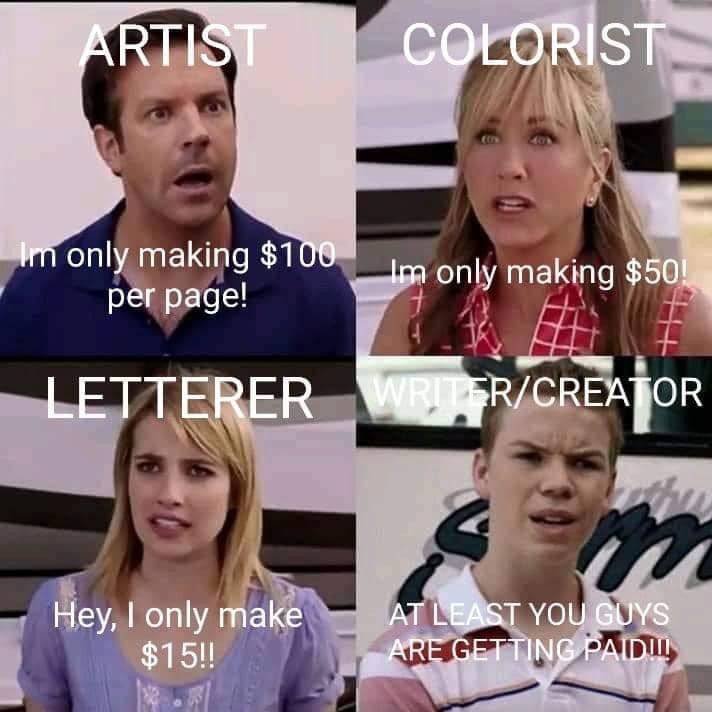A week or two ago, an annoying meme resurfaced on comics social media.

It’s funny, right?
No. No, it’s not. There’s an implication that indie comic writers are somehow treated unfairly, or that they’re being taken advantage of by other, more mercenary creators. But that’s just not the case.
As a writer/artist, who started off freelancing for other writers, I learned an important lesson. “Your dream project isn’t necessarily your collaborators’ dream project.”
There are a lot of potential reasons for this. I’ve seen scripts where the artist is treated like a wrist-for-hire—whose sole purpose is to bring the writer’s vision to life—instead of that of a collaborator. These scripts dictate camera angles, pacing, and general page composition, removing any sense of agency the artist has and lessening their personal investment in the project. (There’s nothing wrong with writing a script this way, if your personal vision is that strong. But doing so can potentially reduce the personal investment of your collaborators. It’s probably good to understand this going in.)

I’ve seen writers refer to their collaborators as “my artist” all over social media, reducing the artist to a cog, rather than a collaborator. Same thing when the writer refers to it as “my book,” “my comic,” or “my series.” I’ve seen plenty of work-for-hire contracts where the artist has no royalties and no stake in ownership.


While it can be important to establish this relationship, in terms of protecting your intellectual property (especially when working with a complete stranger), it can serve to lessen the artist’s engagement in the success or failure of the project. There’s no incentive for the artist to treat the book as anything more than a paycheck.
There’s nothing wrong with any of these gigs. It’s perfectly fine to do; after all it’s your dream book (as all books should be viewed by their creators).
But if, when dictating those terms (even, in terms of protecting your IP, when establishing a WFH arrangement), a writer feels like they’re getting ripped off because they’re working for free…remember it’s YOUR dream project, not your collaborators’ dream, and that that no one else has an ownership stake.
Remember, YOU sought out the artist, the colorist, and the letterer to work on YOUR book.
I’m not insinuating that anyone is “doing it wrong,” or that making their dream book isn’t a bunch of hard work and unpaid labor. I’m just pointing out an additional insight that may not have occurred to everyone.
Back to the meme that launched this thread: “I’m only making $100 per page!” There’s an implication that the indignant artist, who’s ONLY making $100/page is ungrateful…especially since the poor, taken-advantage-of writer isn’t making anything.
$100/page sounds like a lot of money to most people, until they do the math. Depending on an artist’s style, it can be 10-20 hours work. $5-$10/an hour doesn’t sound quite as appealing, especially when considering revisions, etc.
With this in mind, the part of the meme that says, “At least you’re being paid,” has a whole other implication: “Shut up. Even though you’re making less than minimum wage, at least you’re making money…now get back to work on MY book.”
“Your dream project isn’t necessarily your collaborators’ dream project” has shaped how I view collaborations. And after having been treated like a wrist—in freelance RPG and comics projects—has shaped how I collaborate with other artists on our books. I’m grateful for every collaborator I work with. I know that they have their own ideas and I appreciate that they’re choosing to work with me on something instead of creating something themselves entirely on their own.
